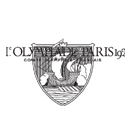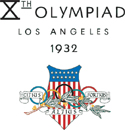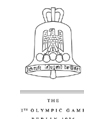OLYMPICS
Modern History of Olympics
1896-1952
1896 Athens, Greece
|
Venue :
Athens , Greece (GRE)
|
|
Nations Participated : 14
|
|
Events : 43
|
|
Winner : USA with 20 points
|
|
Medals
|
First
|
Second
|
Third
|
|
USA
|
11
|
7
|
2
|
|
Greece
|
10
|
17
|
19
|
|
Germany
|
6
|
5
|
2
|
|
Opening Date :
06 April 1896
|
|
Athletes : 241
|

Medal |
The very first modern Olympic Games were held in the first week of April 1896 at
Panathenaic Stadium in Athens. The people of Athens greeted the Games with great
enthusiasm. Pole vaulting, sprints, shot put, weight lifting, swimming, cycling,
target shooting, tennis, marathon and gymnastics were all events at the first
Olympics. The swimming events were held in the Bay of Zea in the Aegean
Sea. The American James Connolly won the triple jump to become the first
Olympic champion in more than 1,500 years. Winners were awarded a silver medal
and a crown of olive branches.
1900 Paris, France
|
Venue : Paris, France
|
|
Nations Participated : 19
|
|
Events : 95
|
|
Winner : France with 100 Points
|
|
Medals
|
First
|
Second
|
Third
|
|
France
|
25
|
41
|
34
|
|
USA
|
19
|
14
|
14
|
|
Great Britain
|
15
|
6
|
9
|
|
Opening Date : 14 May 1900
|
|
Athletes: 997
|

Medal
|
The Games of 1900 were held in Paris as part of the Exposition Universelle
Internationale - the Paris World’s Fair. The years Olympics
were poorly organized and poorly publicized, because of the fair. It was in this Olympic Games
that women first participated as contestants. The first female champion was in
tennis, Charlotte Cooper of Great Britain. In athletics, different nations
competed on the same team in five categories.
1904 St. Louis, USA
|
Venue : St. Louis,
USA
|
|
Nations Participated : 12
|
|
Events : 91
|
|
Winner : USA with
244 Points
|
|
Medals
|
Gold
|
Silver
|
Bronze
|
|
USA
|
77
|
81
|
78
|
|
Germany
|
4
|
4
|
5
|
|
Cuba
|
4
|
2
|
3
|
|
Opening Date
: 01 July 1904
|
|
Athletes
: 645 athletes (6 women, 645
men)
|
 Medal
Medal
|
The venue fixed at Chicago was later changed to St. Louis, to coincide with the city’s
International Trade Fair. They were the first at which gold, silver and
bronze medals were awarded for first, second and third place. Events
like Boxing and freestyle wrestling were introduced for the first time. As the venue of the
games was far away from Europe, international participants were comparatively
less because of the huge distance and the expenses
for the journey by ship. One of the most remarkable
athletes was the American gymnast George Eyser, who won six medals even though
his left leg was made of wood.
1908 London, Great
Britain
|
Venue : London, Great
Britain
|
|
Nations Participated : 22
|
|
Events : 110
|
|
Winner : Great
Britain with 145 Points
|
|
Medals
|
Gold
|
Silver
|
Bronze
|
|
Great Britain
|
56
|
51
|
38
|
|
USA
|
23
|
12
|
12
|
|
Sweden
|
8
|
6
|
11
|
|
Opening Date : 27 April 1908
|
|
Athletes: 2,008 athletes (37 women,
1,971 men)
|

|
|
Medal
|
The 1908 Olympics originally awarded to Rome, were reassigned to
London. At the Opening Ceremony, the athletes marched into the stadium by
nation, as most countries sent selected national teams. It was in the 1908
Olympic Games that the exact distance of a marathon was established as 26 miles
and 365 yards. Diving and field hockey was added to the events that year.
1912 Stockholm,
Sweden
|
Venue : Stockholm,
Sweden
|
|
Nations Participated : 28
|
|
Events : 102
|
|
Winner : USA
with 63 Points
|
|
Medals
|
Gold
|
Silver
|
Bronze
|
|
USA
|
25
|
19
|
19
|
|
Sweden
|
24
|
24
|
17
|
|
Great Britain
|
10
|
15
|
16
|
|
Opening Date
:05 May 1912
|
|
Athletes: 2,407 athletes (48 women,
2,359 men)
|

|
|
Medal
|
The 1912 Olympics at Stockholm was very well organized. The Swedish hosts
introduced the use of unofficial electronic timing devices for the track events,
as well as the first use of a public address system. Boxing contests were banned
in this Olympics. Women's events in swimming
and diving were introduced. The most popular hero of the 1912 Games was Jim Thorpe of the
United States. Thorpe won the five-event pentathlon and shattered the world
record in the ten-event decathlon. After the games, the International
Olympic Committee decided to limit the power of host nations deciding the
Olympic program.
1916 Berlin, Russia
Though the 1916 Olympic Games were scheduled to be held in Berlin, World War
I caused the Olympic Games to be cancelled.
1920 Antwerp,
Belgium
|
Venue : Antwerp
Belgium
|
|
Nations Participated : 29
|
|
Events : 154
|
|
Winner : USA
with 95 points
|
|
Medals
|
Gold
|
Silver
|
Bronze
|
|
USA
|
41
|
27
|
27
|
|
Sweden
|
19
|
20
|
25
|
|
Great Britain
|
16
|
15
|
13
|
|
Opening Date : 20 April 1920
|
|
Athletes : 2,626 athletes (65 women,
2,561 men)
|

|
|
Medal
|
The 1920 Olympic Games followed soon after the ending of World War I. Since the
war had ravaged throughout Europe, funding and materials for the Games was
difficult to acquire. The number of spectators were very low, mainly because
people could not afford tickets after the war. The Opening Ceremony was
notable for the introduction of the Olympic flag and the presentation of the
Athletes’ Oath. The United States turned in the best overall team performance,
winning 41 gold medals. A 23-year-old distance runner Paavo Nurmi of
Finland became the star of the games by winning 3 gold medals in the 10km
and 8km cross country and cross-country team event. He also won silver in
the 5km event.
1924 Paris, France
|
Venue : Paris, France
|
|
Nations Participated : 44
|
|
Events :
126
|
|
Winner : USA
with 99 Points
|
|
Medals
|
Gold
|
Silver
|
Bronze
|
|
USA
|
45
|
27
|
27
|
|
Finland
|
14
|
13
|
10
|
|
France
|
13
|
15
|
10
|
|
Opening
- Closing Date
: 04 May 1924
- July 27th
|
|
Athletes :
3,089 athletes (135 women, 2,954 men)
|
 Medal
Medal
|
 Emblem
Emblem |
At the 1924 Paris Games the number of participating nations jumped from 29 to
44, signaling widespread acceptance of the Olympics as a major event. Finnish runner Paavo
Nurmi, won five gold
medals to add to the three he had won in 1920.
Women’s fencing made its debut as Ellen Osiier of Denmark earned the gold
medal without losing a single bout. After much debate, winter sports were added to the Olympic Games this year.
The winter events were held in January and February, creating a tradition that
the winter events would be held a few months before the summer events.
1928 Amsterdam, Netherlands
|
Venue : Amsterdam, Netherlands
|
|
Nations Participated : 46
|
|
Events : 126
|
|
Winner : USA
with 56 Points
|
|
Medals
|
Gold
|
Silver
|
Bronze
|
|
USA
|
22
|
18
|
16
|
|
Germany
|
10
|
7
|
14
|
|
Finland
|
8
|
8
|
9
|
|
Opening Date
: 17 May 1928
|
|
Athletes
: 2,883 athletes (277 women,
2,606 men)
|

|
|
Medal
|
The Olympic flame was introduced at this Olympic games. The track
and field events and gymnastics for women were also introduced even though there was too much
resistance to these additions. At the Opening Ceremony, the team from Greece led
the Parade of Nations and the host Dutch team marched in last. Greece first,
hosts last would become a permanent part of the Olympic protocol. For the first
time, Asian athletes won gold medals. Mikio Oda of Japan won the triple jump,
while his teammate, Yoshiyuki Tsuruta, won the 200m breaststroke.
1932 Los Angeles , USA
|
Venue : Los Angeles , USA
|
|
Nations Participated : 37
|
|
Events : 117
|
|
Winner : USA with 103 points
|
|
Medals
|
Gold
|
Silver
|
Bronze
|
|
USA
|
41
|
32
|
30
|
|
Italy
|
12
|
12
|
12
|
|
France
|
10
|
5
|
4
|
|
Opening Date :
30 July 1932
|
|
Athletes :
1,332
|

|
 |
|
Medal
|
Emblem |
For a time being it seemed like that no one was going to attend the
1932 Olympic games as it was held in the middle of the 'Great Depression' and in
the comparatively remote city of Los Angeles. Then a few Hollywood stars offered
to entertain the crowd and ticket sales picked up. But the level of competition
was extremely high and 18 world records were either broken or equaled. Los
Angeles had constructed the very first Olympic Village for the Games which
consists bungalows, hospital, post office, library and a large number of eating
establishments. 1932 Olympic games introduced the first photo-finish
cameras as well as the victory platform. Finnish runner Paavo Nurmi, who had been one
of the Olympic heroes in the past several Olympic Games, was considered to have
turned professional and was not allowed to compete.
1936 Berlin, Germany
|
Venue : Berlin, Germany
|
|
Nations Participated : 49
|
|
Events : 129
|
|
Winner : Germany with 89 points
|
|
Medals
|
Gold
|
Silver
|
Bronze
|
|
Germany
|
33
|
26
|
30
|
|
USA
|
24
|
20
|
12
|
|
Hungary
|
10
|
1
|
5
|
|
Opening Date
: 01 August 1936
|
|
Athletes :
3,963
|

|

|
|
Medal
|
Emblem
|
The 1936 Olympics, held in Berlin, are best remembered for Adolf Hitler’s
failed attempt to use them to prove his theories of Aryan racial superiority.
The Nazis saw the event as a way to promote their ideology. They built four
grandiose stadiums, swimming pools, an outdoor theater, a polo field, and an
Olympic Village that had 150 cottages for the male athletes. Throughout the
Games, the Olympic complex was covered in Nazi banners. 1936 saw the
introduction of the torch relay, in which a lighted torch is carried from
Olympia to the site of the current Games. These Games were the first ones
televised and were the first to use telex transmissions of the results. The most
popular hero of the Games, was the African-American sprinter and long jumper
Jesse Owens, who won four gold medals.
1940 Tokyo, Japan
The 1940 Olympic Games were originally scheduled to be held in Tokyo, Japan.
But the start of World War II in 1939 caused the Games to be cancelled.
1944
The 1944 Olympic Games were also not held because of World War II.
1948 London, Great Britain
|
Venue : London , Great Britain
|
|
Nations Participated : 59
|
|
Events : 136
|
|
Winner : USA with 82 points
|
|
Medals
|
Gold
|
Silver
|
Bronze
|
|
USA
|
38
|
27
|
19
|
|
Sweden
|
16
|
11
|
17
|
|
France
|
10
|
6
|
13
|
|
Opening Date
: 29 July 1948
|
|
Athletes
: 4,104
|

|
 |
|
Medal
|
Emblem
|
The 1948 London Games were the first to be shown on home television.
Though World War II was over, Europe was still ravaged from the war. To limit
England's responsibility to feed all the athletes, it was agreed that the
participants would bring their own food. Surplus food was donated to British
hospitals. Germany and Japan, the aggressors of World War II, were not invited
to participate. Though there had been much debate as to whether or not to hold
the 1948 Olympic Games, the Games turned out to be very popular and a great
success.
1952 Helsinki, Finland
|
Venue : Helsinki, Finland
|
|
Nations Participated: 69
|
|
Events : 149
|
|
Winner : USA with 76 points
|
|
Medals
|
Gold
|
Silver
|
Bronze
|
|
USA
|
40
|
19
|
17
|
|
USSR
|
22
|
30
|
19
|
|
Hungary
|
1 6
|
10
|
16
|
|
Opening Date :
19 July 1952
|
|
Athletes :
4,955
|

|
 |
|
Medal
|
Emblem
|
The 1952 Olympic Games held at Helsinki were largely a reflection of the Cold
War. The games began as Finnish runner Paavo Nurmi, carried the torch into the stadium and
handed it to Hannes Kolehmainen, who lit the cauldron.
The Soviet Union entered
the Olympics for the first time. Although their athletes were housed in a
separate 'village', warnings that Cold War rivalries would lead to
clashes proved unfounded. The competition of East versus West dominated the
atmosphere. Particularly impressive were the Soviet women gymnasts who won the
team competition easily, beginning a streak that would continue for forty years
until the Soviet Union broke up into separate republics.



 Medal
Medal



 Medal
Medal
 Emblem
Emblem













